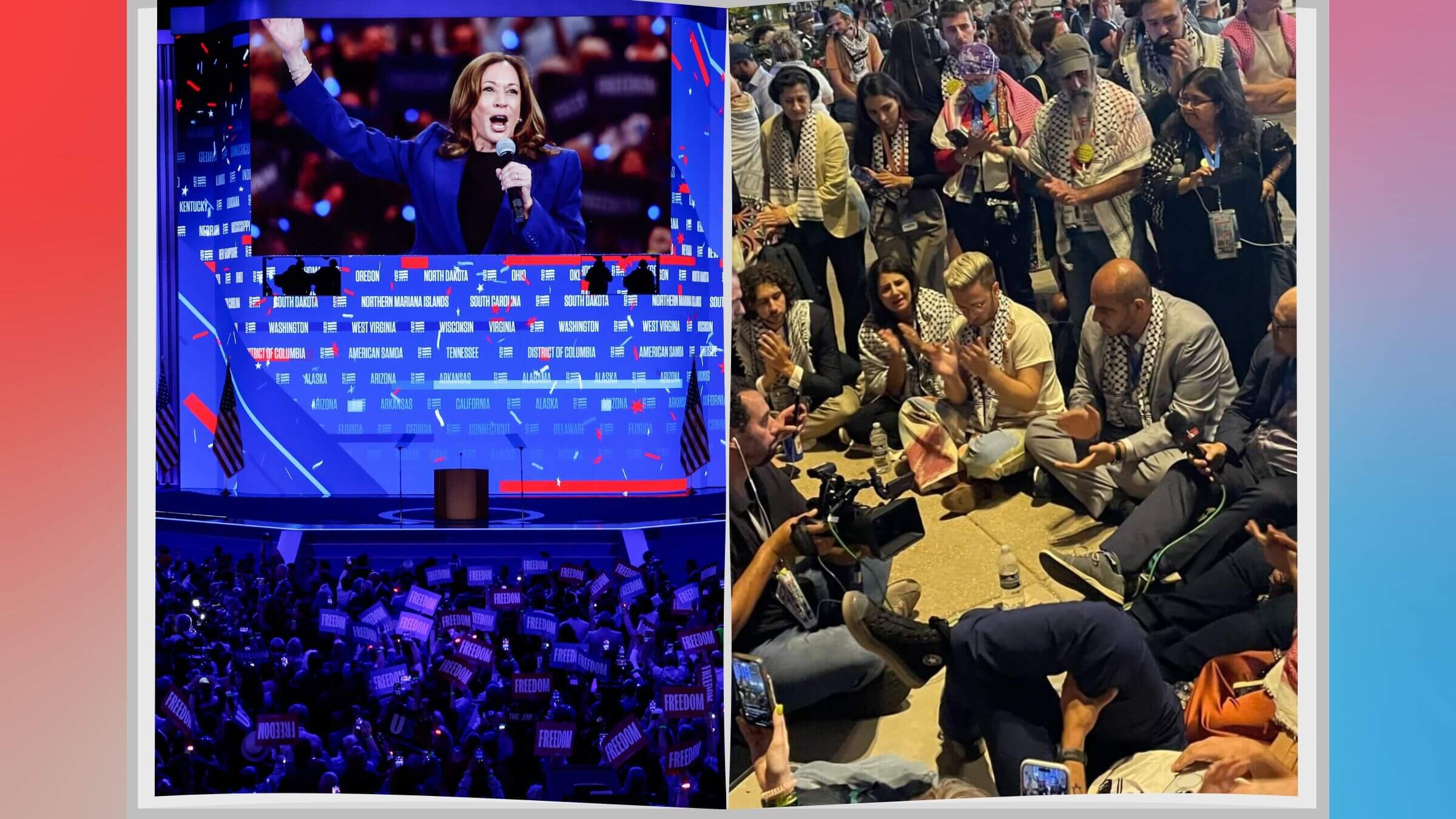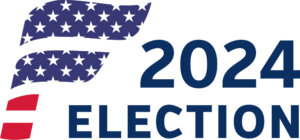Everyone is talking about Palestinians this election cycle. No one is actually listening to us
Extremist voices have monopolized ‘true’ expressions of solidarity with Gaza

Navigating the 2024 presidential election as a Palestinian American has been unbelievably challenging. Photo by Chip Somodevilla/Getty Images; Jacob Kornbluh
When people in the United States find out about my background as a Palestinian American from Gaza, they will often assume or project what they think I believe or should believe.
 They expect me to be anti-anything Israel-related and to blame the Democrats and President Joe Biden for the “genocide” in Gaza. They presume that I am all in on the resistance rhetoric, that I wholeheartedly support all “pro-Palestine” protests, and expect that I promote specific actions that they feel constitute acts of solidarity with Palestinians. These projections have become even more intense during an election season when my home is the site of a bloody war that has captured the globe’s attention.
They expect me to be anti-anything Israel-related and to blame the Democrats and President Joe Biden for the “genocide” in Gaza. They presume that I am all in on the resistance rhetoric, that I wholeheartedly support all “pro-Palestine” protests, and expect that I promote specific actions that they feel constitute acts of solidarity with Palestinians. These projections have become even more intense during an election season when my home is the site of a bloody war that has captured the globe’s attention.
Over the past 11 months, I have come to believe that an exclusionary and radical set of players has hijacked the Palestinian narrative, particularly in the diaspora. They claim to speak on behalf of the “pro-Palestine” movement and have created a narrow lane for what constitutes “authentic” pro-Palestine advocacy and action. This has made advocating for political changes in the U.S. that might actually help Palestinians infinitely more complicated.
When our community is reduced to the stereotype of “intifada” revolutionary types who are against the United States, the Democratic Party, or any solution that legitimizes Israel, we are not seen as worthy of respect, inclusion or a seat at the table.
A dominant and inflexible narrative has emerged, especially after the Oct. 7 attack. It is one that uses the phrase “by all means necessary” as coded language for armed resistance, rejects the idea of two peoples coexisting in two separate states and espouses harsh positions that will not attract new allies.
The truth is that there is no unified Palestinian voice in the United States, and these extremist voices have monopolized what “true” expressions of solidarity with Gaza should look like, limiting the range of views that individuals, including Palestinian Americans, can express.
This new harmful and impractical devolution has negatively impacted how one can display empathy for and solidarity with Palestinians. It has also badly influenced how Palestinian Americans and their “allies” are engaging in electoral politics in a heated and tense election cycle.
U.S. electoral politics already tend to oversimplify the political orientation of various demographic groups, reducing diverse communities to singular issues that don’t represent the various interests, concerns and divergent thoughts within them. Analysts have been caught by surprise, for instance, that some Hispanic voters started to vote Republican in recent years, when many thought they only cared about immigration and would always be staunch Democrats.
Election campaigning regularly reduces people of color to their ethnic or national identities, portraying them as narrowly focused on single issues without leaving space for diverse opinions or interest in multiple topics.
When it comes to Palestinian Americans, the assumption is that we all support the cause of Palestinian liberty with the same ideological rigidity as those on the left who claim to be supportive allies — a stance that now sometimes includes tolerating and embracing violent acts like those committed on Oct. 7. These individuals on the left, however, do not know what it is like to live under Hamas. They don’t tolerate any divergent views or critiques of Palestinian mistakes, nor do they promote realistic views on what a meaningful and pragmatic resolution could look like beyond maximalist demands.
Crucially, the singular voice that they suggest represents the immensely diverse Palestinian and Palestinian American communities does not do so. The same individuals who often champion the diversity of communities of color, calling them non-monolithic, have been quick to forget that we are all individuals with ideas that are not dictated by a single identity. Like everyone else, the Palestinian American community has varied points of view and different ideas on how to achieve justice and peace for ourselves and our people.
The broad dismissal of this complexity by those who are not themselves Palestinian has been a common feature of my experience in this election season. The social deconstruction of our vibrant, multifaceted community, far from helping our appeals for support, has only dehumanized us further. It has inflamed the already divisive rhetoric around Israel and Palestine, and it has done little to address the absence of Palestinian voices or representation in the national conversation.
Palestinian perspectives and voices have historically been marginalized and excluded from the foreign policy discussion, making it difficult to criticize Israeli policies, lest one be accused of antisemitism. Now, however, the Palestinian narrative and story, due to the horrors in Gaza, is being heard like never before. The world is finally beginning to acknowledge publicly that the Palestinian people deserve equality, independence and statehood — just as the Jewish people do.
Unfortunately, this regenerated interest and support is being drowned out by the noise and vitriol created by extremists who claim to represent “the” Palestinian voice. They undermine the righteous Palestinian cause for self-determination and freedom from Israeli oppression with calls for violence and antisemitic rhetoric. They advocate all-or-nothing positions like the abolition of the Israeli state, and refuse to work with mainstream Jewish and Israeli audiences to build a consensus for shared political goals. A glaring example of this was when the BDS movement called for boycotting Standing Together, a leftist Israeli-Palestinian allyship organization working to promote anti-occupation narratives and action.
This extremist message has made political institutions more reluctant to highlight Palestinian voices. That was made most achingly clear by the decision not to highlight a Palestinian speaker at the Democratic National Convention. To me — as someone whose name was put forward as a potential speaker — it seems likely that the perception of the pro-Palestinian contingent as radioactive and divisive informed this wrongheaded choice.
This is a lose-lose scenario. When Palestinians find ourselves ignored by both major political parties, it proves the extremist point that we are an overlooked minority and further emboldens the radical activists who have helped make it so difficult for us to be heard in the first place.
I love the United States, and I am eternally grateful to be part of this incredible nation of ours. But I do not feel adequately represented by the current Israel and Palestine discourse here. It pains me that in an American electoral context, my voice has been suppressed from the national conversation, both because of my identity and due to people’s projections of what I, as a Palestinian American from Gaza, would say.
I know my Jewish and Israeli-American allies and friends are also suffering from a similar dynamic within their communities. Their identities, too, have been hijacked by extremist voices claiming to speak for them as a monolithic group. American Jews, Israelis and Palestinians have been pitted against each other in pursuit of legitimacy and recognition by America’s political leadership and parties.
Navigating a heated election cycle while experiencing the worst contemporary chapter of Palestinian suffering has been one of the most challenging times of my life. My government has directly contributed to the horrors in Gaza — including my own suffering, with the killing of 31 family members — through its massive military support for Israel and failure to put any real pressure on an ally who is so dependent on that support. Yet the U.S. is my home, and I still believe in this country and its potential to play a positive role in the world, including as part of the resolution of the Israeli-Palestinian conflict.
There is still time during this presidential campaign to offer diverse Palestinian voices an opportunity to positively contribute to the pursuit of protecting our democracy.















